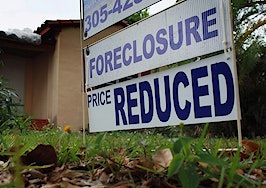The Trump administration has pulled back two Obama-era fair housing rules designed to address housing discrimination, prompting outcries from a slew of housing and civil rights groups.
On Sept. 8, the U.S. Department of Housing and Urban Development (HUD) officially repealed the 2015 Affirmatively Furthering Fair Housing (AFFH) rule, replacing it with a rule titled “Preserving Community and Neighborhood Choice.” Although President Trump announced the 2015 AFFH rule’s repeal at the end of July, it was not until Tuesday that the rule was revoked.
According to a HUD primer, the AFFH rule provided a framework for local governments, states, and public housing agencies to follow through on pre-existing AFFH legislation included in the 1968 Fair Housing Act.
The ruled required all local, state, and public housing officials to use the Affirmatively Fair Housing Assessment Tool, which uses HUD data and questionnaires to help leaders identify “patterns of integration and segregation; racially and ethnically concentrated areas of poverty; disparities in access to opportunity; and disproportionate housing needs, as well as the contributing factors for those issues.”
In language some decried as racist, Trump had said the rule, which required local governments to create a plan for remedying housing discrimination and segregation, was leading to the demise of suburban neighborhoods.
“I am happy to inform all of the people living their suburban lifestyle dream that you will no longer be bothered or financially hurt by having low-income housing built in your neighborhood,” Trump tweeted on July 29.
“Your housing prices will go up based on the market, and crime will go down,” Trump added in a second tweet. “I have rescinded the Obama-Biden AFFH Rule. Enjoy!”
The new Preserving Community and Neighborhood Choice rule returns implementation of the AFFH rule to what it was in the early years of the Fair Housing Act, according to HUD.
“HUD grantees are generally required to certify that they will ‘affirmatively further fair housing’ (AFFH) through HUD’s implementation of the 1968 Fair Housing Act and other applicable statutes. For years after this certification was first required, it was merely part of a general commitment to use the funds in good faith and accompanied similar certifications not to violate various civil rights statutes,” the agency said.
“Over time however, HUD began to use this AFFH certification as a vehicle to force states and localities to change zoning and other land use laws. This was done via a series of regulations and guidance documents culminating with the 2015 AFFH rule.
“In the new rule, HUD repeals the 2015 AFFH rule and its related accretions. The new rule returns to the original understanding of what the AFFH certification was for the first eleven years of its existence: AFFH certifications will be deemed sufficient provided grantees took affirmative steps to further fair housing policy during the relevant period.”
In an interview with Inman reporter Marian McPherson, Debby Goldberg, vice president of housing policy at the National Fair Housing Alliance, told Inman that before the Obama-era AFFH rule certain jurisdictions would do the bare minimum to escape possible legal ramifications.
“In the old days, you know, pre-2015, it was not uncommon for jurisdictions to hold Fair Housing poster contests during April, which is Fair Housing Month,” Goldberg explained. “They would have school kids do posters about fair housing, and somebody would judge them and they would, you know, pick a winner and award prizes.”
“That was what they would claim they were doing to affirmatively further fair housing,” she added. “And they would be deemed in compliance.”
According to the NFHA, the new rule will no longer require jurisdictions to do any kind of fair housing planning.
“They will not be asked to consider any data, analysis or public input on local patterns of segregation and integration, disparities in access to community resources and amenities, discrimination and systemic racism or the like. Actions they take that perpetuate segregation will not be deemed to conflict with their AFFH obligations,” the nonprofit said.
“They will not have to establish fair housing goals, chart a strategy for achieving them or keep records that document those efforts. HUD will not monitor their performance or oversee their compliance with their fair housing obligations. In other words, with this regulation, HUD has effectively abdicated its responsibility to ensure that its programs affirmatively further fair housing, as intended by Congress and interpreted by the courts.”
Three experts, including Goldberg, told Inman it’s important for people to understand the rescinding of the 2015 AFFH rule does not negate the responsibility of jurisdictions that receive HUD funding or Community Development Block Grant funds to prove they’re affirmatively furthering fair housing.
However, Goldberg said the bar has been set so low that it would be hard to take legal action against a jurisdiction for not fulfilling the mandate.
“[HUD] retains the authority to enforce and take enforcement action against a jurisdiction that might not be in compliance, but it would be very hard to find because the rules are so weak,” she said. “It would be very hard to find a jurisdiction that couldn’t point to something it was doing to say that it was in compliance.”
In a press release Tuesday, the NFHA called on HUD to re-instate the 2015 AFFH regulation, saying the new Preserving Community and Neighborhood Choice rule was “a step backwards” in the fight for fair housing and weakens the Fair Housing Act by incorrectly redefining the meaning of fair housing and eliminating important tools for addressing systemic housing discrimination.
“[The new rule] guts the fundamental provisions of the Fair Housing Act’s AFFH mandate, such as eliminating discriminatory housing practices, taking active steps to end segregation, promoting integration, and ensuring that all neighborhoods are well-resourced and that their residents have access to opportunity,” the nonprofit said.
“Simply put, the Preserving Community and Neighborhood Choice rule is a sham; it lacks substance, clarity, and accuracy in its definition of fair housing. To make matters worse, this rule is going into effect amid a global health pandemic and economic downturn that’s disproportionately impacting under-resourced communities of color. It also ignores the growing public outcry for the country to dismantle structural racism and make true progress and equal opportunity a reality for all Americans.”
In a statement, NFHA President Lisa Rice said studies have shown that all residents regardless of race or national origin benefit from diverse, inclusive communities, which is a goal of the Fair Housing Act.
“In a cynical ploy to win over suburban white voters ahead of the election, President Trump has been using social media to spread lies about the 2015 AFFH rule and paint his new rule as a tool to supposedly save the suburbs. But by gutting AFFH, Trump will actually weaken the suburbs,” she said.
Several other housing and civil rights groups blasted the repeal as well, including the National Housing Law Project, the National Low Income Housing Coalition, the National Community Reinvestment Coalition, the Center for Responsible Lending, the Poverty & Race Research Action Council, the Lawyers’ Committee for Civil Rights Under Law, the Center for Disability Rights, the NAACP Legal Defense and Educational Fund and the Council of Large Public Housing Authorities, some of which openly called the Trump administration’s action “racist.”
“Instead of using time and resources to carry out HUD’s mission — to create strong, sustainable, inclusive communities and quality affordable homes for all — this administration has worked to tear down efforts to rectify decades of racist housing policies that created today’s segregated neighborhoods and all its associated harm to children, families, and the country,” said Diane Yentel, president and CEO of the National Low Income Housing Coalition, in a statement.
“It is abhorrent for the administration to use a critical fair housing tool for election year fear-mongering and race-baiting, particularly during a time of reckoning for racial injustices.”
The groups said the new rule served to stoke divisions among Americans, took away an important decision-making tool for local governments to distribute resources and implement strategies to address housing discrimination and lack of access to opportunity, and did nothing to ameliorate the effects of mandated segregation that was federal government policy for decades.
“With this cynical rule change, the Trump government now has one more thing to celebrate with racists who want to make America divided again,” said Jesse Van Tol, CEO of the National Community Reinvestment Coalition, in a statement.
“This new rule will make no positive impact on addressing persistent patterns of racial segregation that continue to create unfair and unjust life outcomes for people based on their ZIP codes. In place of a clear and specific federal mandate to further fair housing, the Trump team came up with empty words and a meaningless responsibility handed off to local governments.
“This new approach affirmatively furthers a racist, do-nothing agenda. Local governments can do nothing but talk, take no action and claim they furthered fair housing. This approach won’t affirmatively further anything other than discrimination.”
At the same time, on Sept. 4, HUD finalized a new rule for its implementation of the Fair Housing Act’s “disparate impact” standard. The 2013 disparate impact rule was meant to prevent discrimination against protected classes under facially neutral policies regardless of intent.
HUD proposed an update to the rule in August 2019, which outlined a five-step threshold for plaintiffs to prove unintentional discrimination and give defendants more guidance on how to rebut the claims. Activists at the time argued the updated guidance would make it easier for businesses and landlords to discriminate and harder for tenants to bring housing discrimination suits.
HUD, meanwhile, argued that the changes to the disparate impact rule were aimed at providing legal clarity and bringing the disparate impact rule more in line with a 2015 Supreme Court ruling. In that 2015 ruling in the case of Texas Department of Housing & Community Affairs v. The Inclusive Communities Project, Inc., the court upheld disparate impact but set vague limitations on applying the rule.
Under the new guidance, plaintiffs now have to establish a link that the practice in question is “arbitrary, artificial and unnecessary” and establish a robust link between the practice and impact. It further requires the plaintiff to prove the practice will have an impact on an entire protected class and not just an individual member of a protected class. The final two steps require the plaintiffs to prove the disparity is significant, and for them to show that their alleged injury is directly caused by the challenged practice.
In a press release Friday, the Lawyers’ Committee for Civil Rights Under Law said the new disparate impact rule “creates overwhelming barriers for victims of discrimination to overcome, and essentially prevents most challenges to policies and practices that preserve residential segregation.”
In a statement, Kristen Clarke, the civil rights organization’s president and executive director, hinted that the new rule would be challenged in court.
“This rule threatens to eviscerate the key protections of the Fair Housing Act and makes it virtually impossible for communities of color to prevail when challenging housing discrimination,” she said.
“Combined with President Trump’s race-baiting rhetoric about efforts to build affordable housing in predominantly white suburbs, it is clear that the administration is engaged in a concerted attack on the housing choices of people of color and Black households, in particular. The civil rights community is prepared to fight this rule with every tool at its disposal, and we expect that the courts will see right through this brazen attempt to roll back civil rights.”
The 1.4 million-member National Association of Realtors called on HUD in July to end its attempt to change the 2013 disparate impact rule and on Wednesday expressed its disapproval of the finalized change.
“Instead of pursuing policies that hamper our ability to address racial inequities in this country, NAR believes the federal government should be working to eliminate barriers to homeownership for all groups of Americans,” said NAR President Vince Malta in a statement.
“NAR supports disparate impact as a legal theory to address the unfair housing practices that inhibit fair housing and unfairly target members of protected classes, while still protecting our members’ ability to run their businesses in a free and functional real estate market. We continue working with state and local Realtor associations to advance our overall commitment to fair housing and housing opportunity.”
The Council of Large Public Housing Authorities said in a press release that the new rule “continues the Trump administration’s aggressive approach to dismantling the most powerful tools for challenging racial discrimination in housing.”
“It is clear the administration ignored the 45,000 comments from industry groups, lenders and fair housing advocates who are united in their opposition to this rule. The consequence of this final rule is that neither public housing authorities nor individuals from groups at risk of discrimination are protected by the Fair Housing Act,” Executive Director Sunia Zaterman said in a statement.
“When also considering HUD’s recent final rule on Affirmatively Furthering Fair Housing, which virtually eliminates a community’s obligation to address racial segregation, there is no question that the Trump administration is intent on removing every available tool for fighting housing discrimination.”
Editor’s note: This story has been updated with a comment from NAR.
Email Andrea V. Brambila.
Like me on Facebook | Follow me on Twitter






